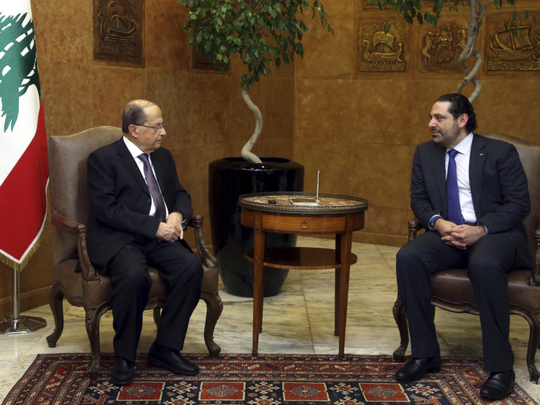
Beirut: For the first time since independence in 1943, a Lebanese president used his constitutional powers to suspend all parliamentary activities for a full month, which postponed an inevitable clash between various constituents anxious to alter the country’s national pact.
Michel Aoun invoked article 59 of the constitution allowing him to suspend parliament for one month in a move that shocked observers — he initially was believed to have backed the extension of parliament in an agreement with Prime Minister Sa’ad Hariri and Parliament Speaker Nabih Berri.
In a televised address, the visibly upset Aoun said the adjournment was necessary in order to give legislators time to devise a new election law.
Discussions which began in 2005 on revising the archaic election law have so far produced no agreement.
According to the 1960 voting law, parliament seats are allocated by religious sects which Lebanon’s most prominent Christian parties want to amend.
They say the law marginalises Christian voters, because, in the winner-take-all model Muslim voters in predominantly Christian districts cast their ballots to candidates backed by lists dominated by non-Christian parties.
The Free Patriotic Movement (FPM), the Lebanese Forces (LF) and the Phalange Party planned to boycott parliament on Thursday which was due to likely extend its term for third time since 2009.
They were pleased by Aoun’s bold move to stop the extension of parliament’s term, even if it was only a temporary fix. They had called for widespread protests in the event of the extension.
Powerful Shiite groups like the Iran-backed Hezbollah and Amal want proportional representation or the winner-takes-all system since that would give it potential control of parliament due to its large numbers.
On his part, Druze leader Walid Junblatt and Progressive Socialist Party chief is also against proportional representation because the Druze are a minority in Lebanon representing approximately less than 8 per cent of the entire population.
Junblatt prefers a behind the scenes “consensual agreement” rather than an open vote either at the cabinet or parliament levels.
The largely Sunni Future movement and their LF allies say they are open for discussing proportional representation despite their reservations and have pushed for a so-called hybrid electoral law that combines proportional representation with the winner-takes-all system.
Berri, who heads Amal, has rejected the boycott and accused the three Christian parties of perpetuating a parliamentary vacuum.












